Everything announced at Unreal Fest 2023
Tim Sweeney addresses the recent layoffs at Epic. Plus: a new licensing model for non-game projects, a peek at version 5.4, and more.
Nick Pfisterer •
Unreal Fest 2023, the latest iteration of Epic's annual conference for Unreal Engine developers, recently concluded in New Orleans. Forty sessions were livestreamed during the conference – view the livestream recordings here – and many more session recordings will be uploaded to YouTube in the weeks to come.
In the event's opening session, we got a word from Tim Sweeney on the recent layoffs at Epic Games, a few notable updates on the Unreal Engine ecosystem, and some hints regarding the future. Here's everything you need to know.
Tim Sweeney addresses the layoffs
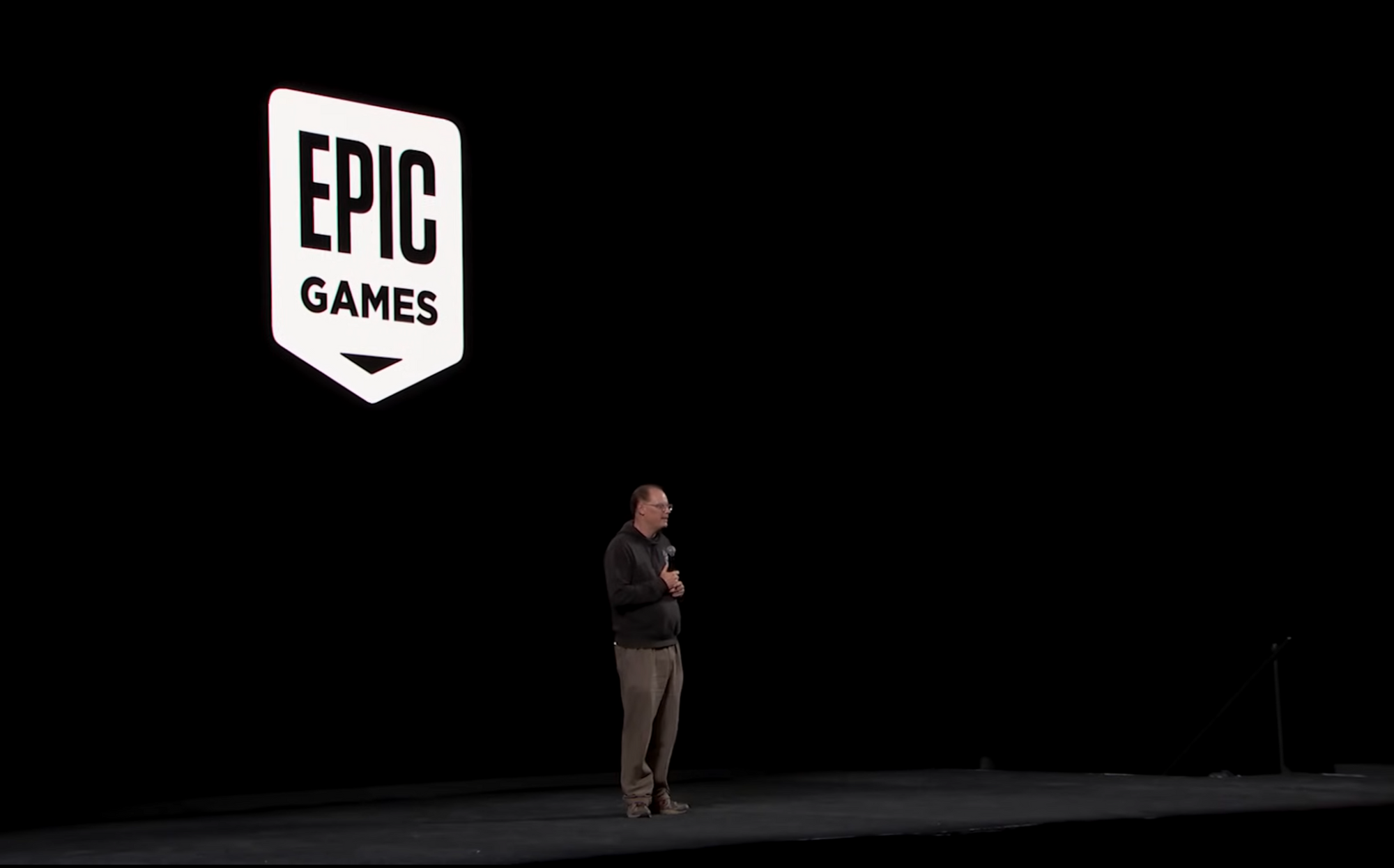
Tim Sweeney kicked off the opening session this year by addressing the recent layoffs at Epic Games. It was a somber moment, but Sweeney was pretty forthcoming about the reality of the situation. In brief: Epic Games laid off at least 830 employees – about 16% of their staff – in order to recover from an extended period of spending way more money than they earned.
At Unreal Fest, we learned that they started overspending in 2021 when the pandemic was beginning to wind down. This was part of an intentional strategy to rapidly grow Fortnite through first-party efforts and the creator ecosystem, with the belief that, someday, their revenue and expenses would match up. This eventually led to significant financial challenges, and the realization that they could not grow out of their problems. It seems Fortnite is becoming much more of a low-margin business than the company anticipated. To survive, they had to become a smaller company again. They tried to spread out the layoffs as much as they could to minimize the damage. Still, some teams were impacted significantly more than others. According to Sweeney, about 3% of the Unreal Engine engineering team was impacted, while business, sales, and marketing teams lost about 30% of their staff.
Sweeney still believes in their core business strategy – build real-time 3D creation tech for creators, and build rich entertainment experiences on top of it – and seems confident that these layoffs will stabilize the company. Sweeney insisted that game developers would not be affected, and that Epic Games would continue to invest in efforts such as the Epic Games Store and Epic Online Services.
A new licensing model for non-game projects
Starting in 2024, people outside of the game industry will no longer be able to use Unreal Engine for free. For those customers, Epic plans to move to a per-seat enterprise licensing model. They're not ready to announce terms yet, but Sweeney said it "won't be unusually expensive or unusually inexpensive", and that it will be similar to other subscription-based software such as Autodesk Maya.
Epic already has an enterprise license for non-games professionals that want premium support, private training, or custom licensing terms, starting at $1,500 per seat / year. I wonder if using the engine will be rolled into this license, or if they will create a new, cheaper license for non-games use that does not include premium support or private training.
This move does not surprise me. Frankly, I am surprised it didn't happen sooner. Right now, if you are delivering custom projects to clients as a freelancer/consultant, or shipping any kind of linear media – film, TV shows, advertisements, or any other non-interactive experience – there are no fees. You can make a commercial film with Unreal Engine 5 and never pay a dime to Epic Games. I have long wondered how sustainable that business model is. I guess I have my answer.
A peek at what's coming in Unreal Engine 5.4
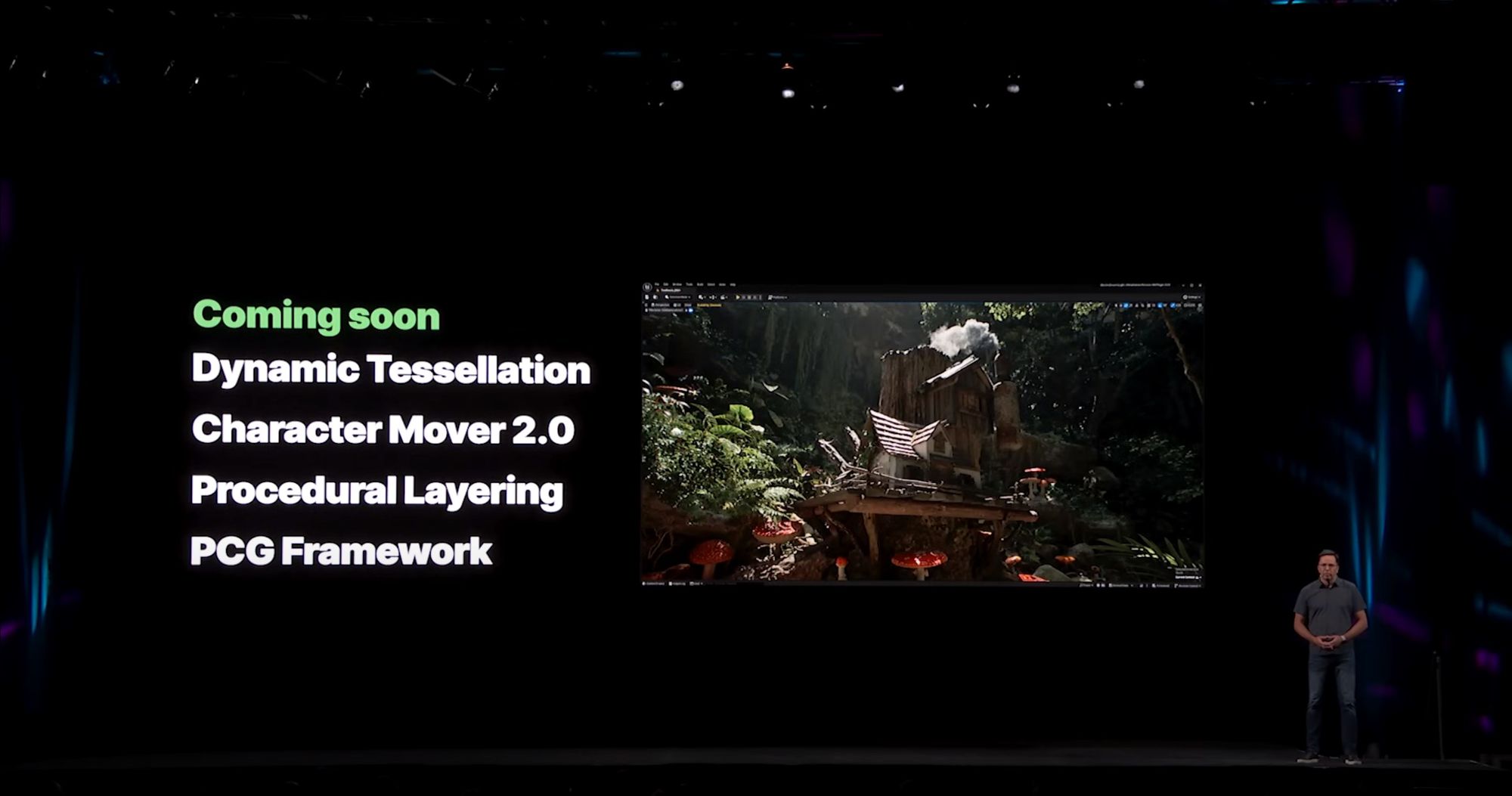
After highlighting some of the key features recently shipped in Unreal Engine 5.3, Simon Tourangeau, VP of Engineering for Unreal Engine, offered a very brief peek at what's to come in Unreal Engine 5.4.
- Dynamic Tessellation for Nanite – Allows you to apply displacement at runtime and greatly increase geometry detail without making your meshes larger on disk.
- Character Mover 2.0 – A full revamp of the legacy character movement.
- Procedural Layering for Animations – An experimental feature for efficiently authoring layered animations for weapons and props.
- PCG Framework – Aiming for it to be production ready in 2024.
You can learn more about what's coming in 5.4 and beyond by checking the Unreal Engine roadmap. The full feature set for 5.4 is not yet confirmed, but they recently added a new "Forward Looking" tab that reflects all the features that are currently under active development, with the disclaimer that none are guaranteed to ship in a specific engine version or timeframe.
Doubling down on the Epic Dev Community
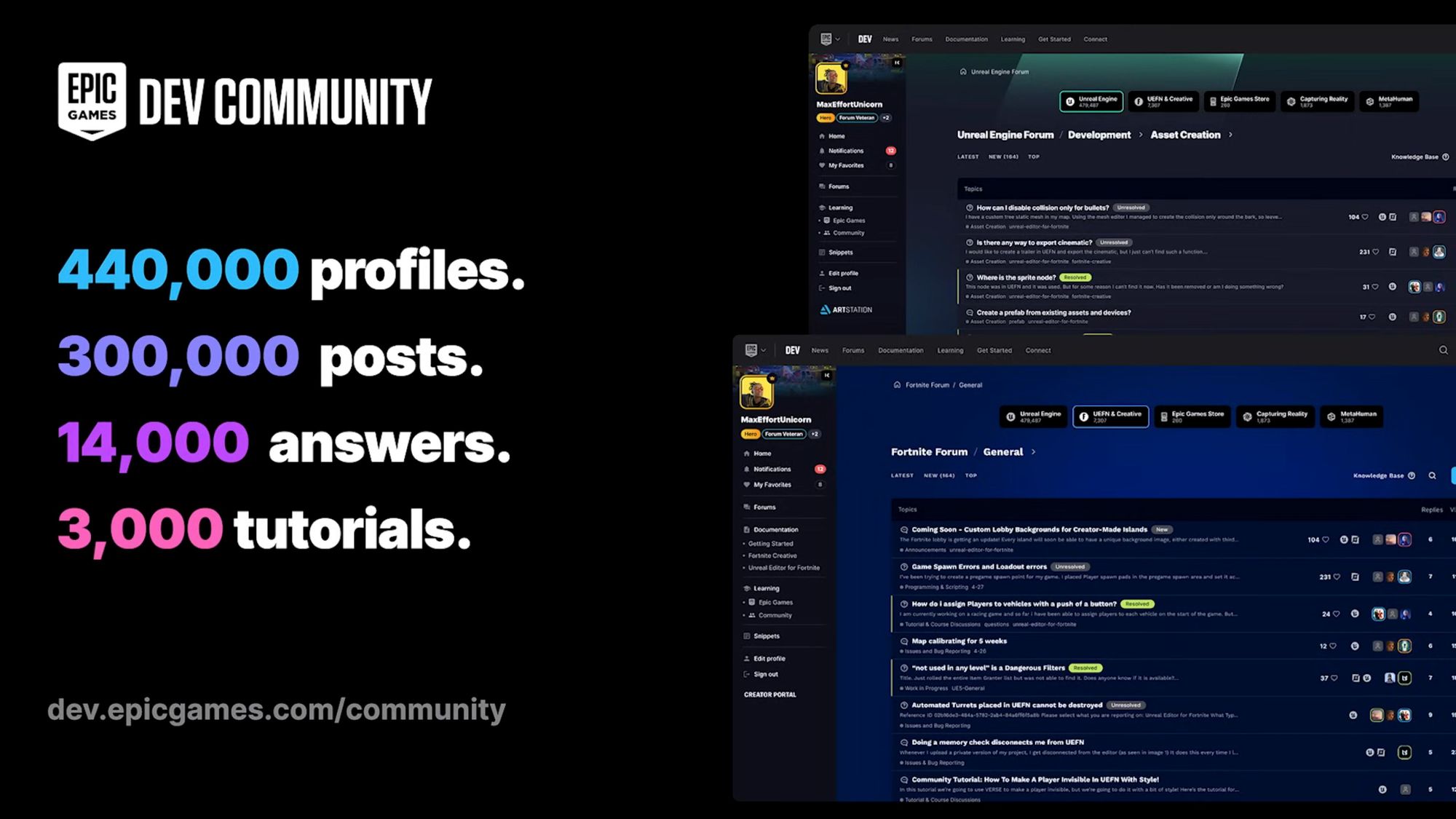
Bill Clifford, VP of Unreal Engine, shared some stats regarding the growth of the new Epic Dev Community. Launched earlier this year during GDC, the Epic Dev Community (EDC) is the new official hub for Unreal developers. It's home to the official forums and all of Epic's tutorials and courses, but you can also create your own tutorials, code snippets, and a profile to showcase your work. With nearly half a million profiles, 300,000 posts, 14,000 answers provided, and 3,000 tutorials available, the site has already grown considerably and contains a treasure trove of valuable learning resources.
Clifford revealed that Epic is doubling down on the EDC, with plans to migrate all the Unreal Engine documentation over to the new platform, along with all the remaining disparate forums for other products in their ecosystem. Clifford also mentioned that new features were coming to the learning library, but did not go into specifics.
If you want to get an idea of how Unreal Engine documentation will feel when it moves to EDC, take a look at the UEFN documentation. It seems pretty nice, and a little snappier than the current UE docs website, so this seems like a positive change.
UEFN + Creator Economy 2.0 updates
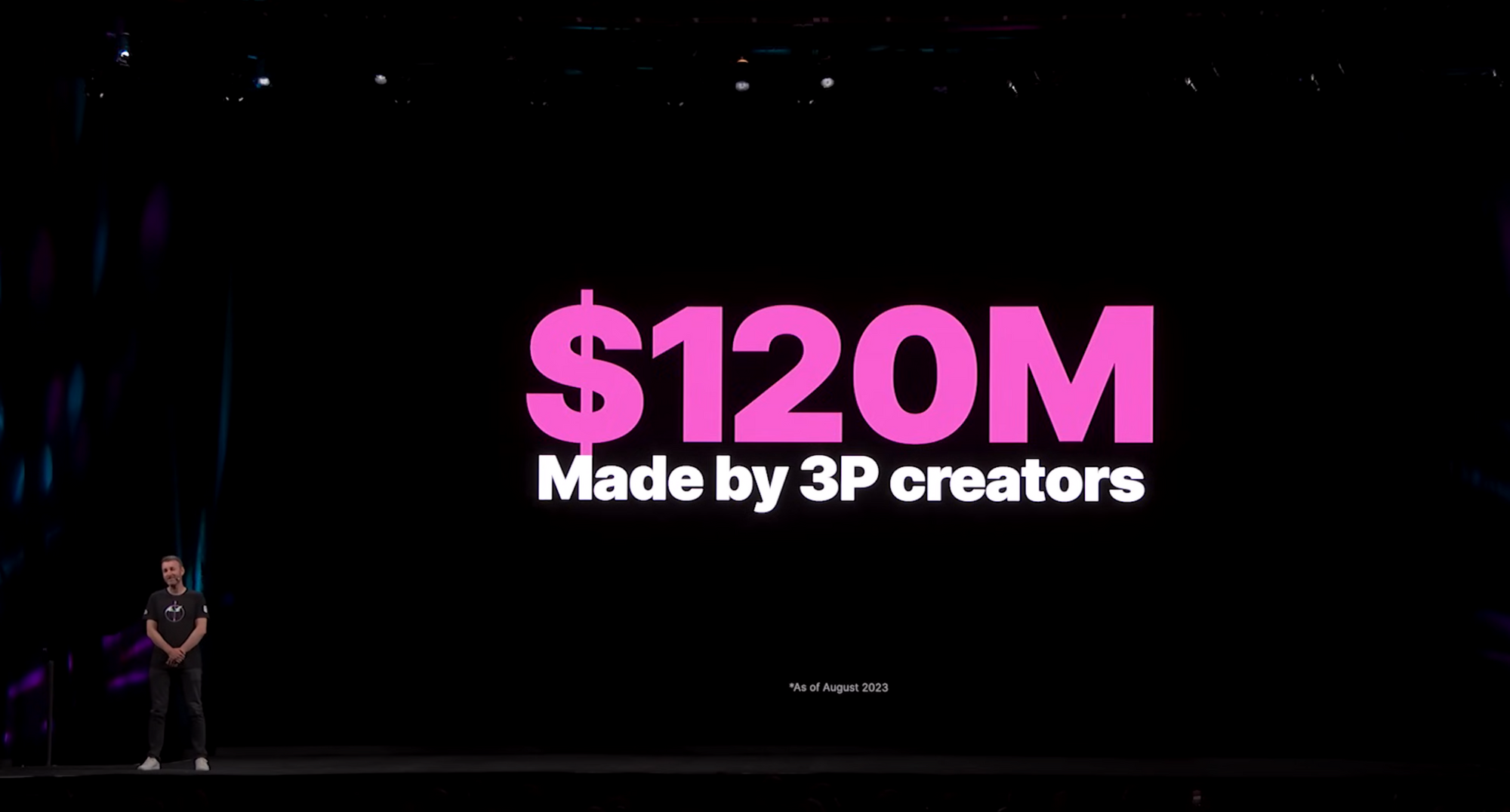
Tony Driscoll, VP of the Fortnite Creator Ecosystem, shared an update on Creator Economy 2.0, the new engagement-based payout system that launched 7 months ago alongside UEFN.
- Over 13,000 creators signed up
- Over $120 million paid out to third-party creators
- 80% of new islands receive ~25,000 unique impressions within the first 7 days
Driscoll also noted that Fortnite will soon feature internationally-recognized age ratings for all playable content, thanks to a new partnership with the International Age Rating Coalition (IARC). This is a pretty significant step toward Fortnite becoming less of a game and more of an ecosystem all its own. Imagine if Unreal Tournament 3 mods back in the day were all age rated. The mod scene would have turned out pretty differently!
A future of convergence
Driscoll hosted a very short Q&A session on UEFN with Jessica Jean Armstrong, COO & Creative Director at 404 Creative, and Pete Hawley, Chief Product Officer at 100 Thieves. Driscoll did not offer much in the way of substantive answers to JJ and Pete's questions, but he did say one thing that caught my attention. When asked if there is a future where UE and UEFN become one, he had this to say:
Yeah, I think the theme of convergence, you probably are going to hear a lot of from the various talks here. Over time we do expect all these tools coming together. (sic) Obviously we have ... Unreal Engine ... and then Fortnite Creative and all that sort of grew up there, and then GDC launching UEFN. You're going to start to see all of these tools converge so that ultimately we create this nice little continuum of player creators graduating up, people from traditional games coming in, and we hope to have a toolset that works for everyone over time. That's definitely where we're going with things.
It's easy to imagine that Epic might be working toward a future where the Unreal Engine ecosystem becomes more unified, but hearing Driscoll explicitly hint at this was illuminating. Obviously Epic isn't yet ready to discuss what form the converegence will take, but one way or another, it is likely to happen. As someone on the Unreal Engine side who is still very focused on developing "traditional" games and experiences, I have some trepidation about how this will affect me and my business.
Do you see a future where traditional games can continue to thrive alongside Fortnite and other metaverse-inspired experiences? Let me know in the comments below.
FAB delayed until 2024
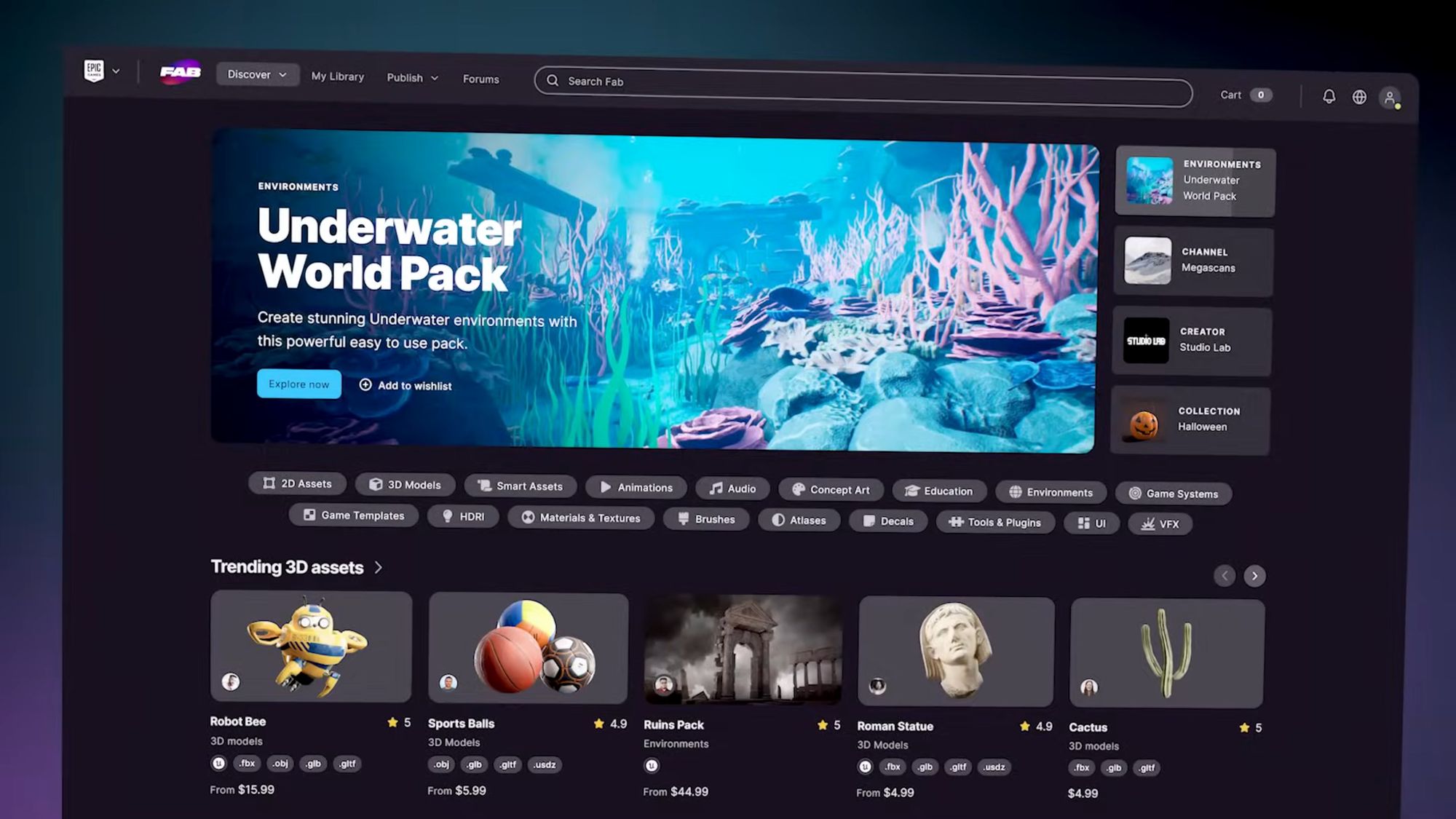
FAB, the new unified marketplace that was first announced at GDC earlier this year, has been delayed until 2024. This was recently announced on X (formerly Twitter), but highlighting it on stage at Unreal Fest made sense. For those not in the know: when FAB launches, all of Epic's current marketplaces – Unreal Marketplace, Quixel Megascans, ArtStation Marketplace, and Sketchfab – will merge into one unified, engine-agnostic marketplace. For Unreal Engine developers, there will be a FAB plugin that allows you to search for assets and drop them directly into your scene without leaving the editor, much like the Quixel Bridge plugin.
If you don't want to wait until 2024 to get a feel for FAB, you can try the alpha version now inside UEFN.
Stay tuned for all the sessions from Unreal Fest
If you want to catch up on all the sessions from Unreal Fest, keep an eye on the Unreal Engine YouTube channel over the next several weeks. In the mean time, you can watch the full opening session or check out one of four sessions that have been uploaded so far, including this one on the current state of audio in UE5.
